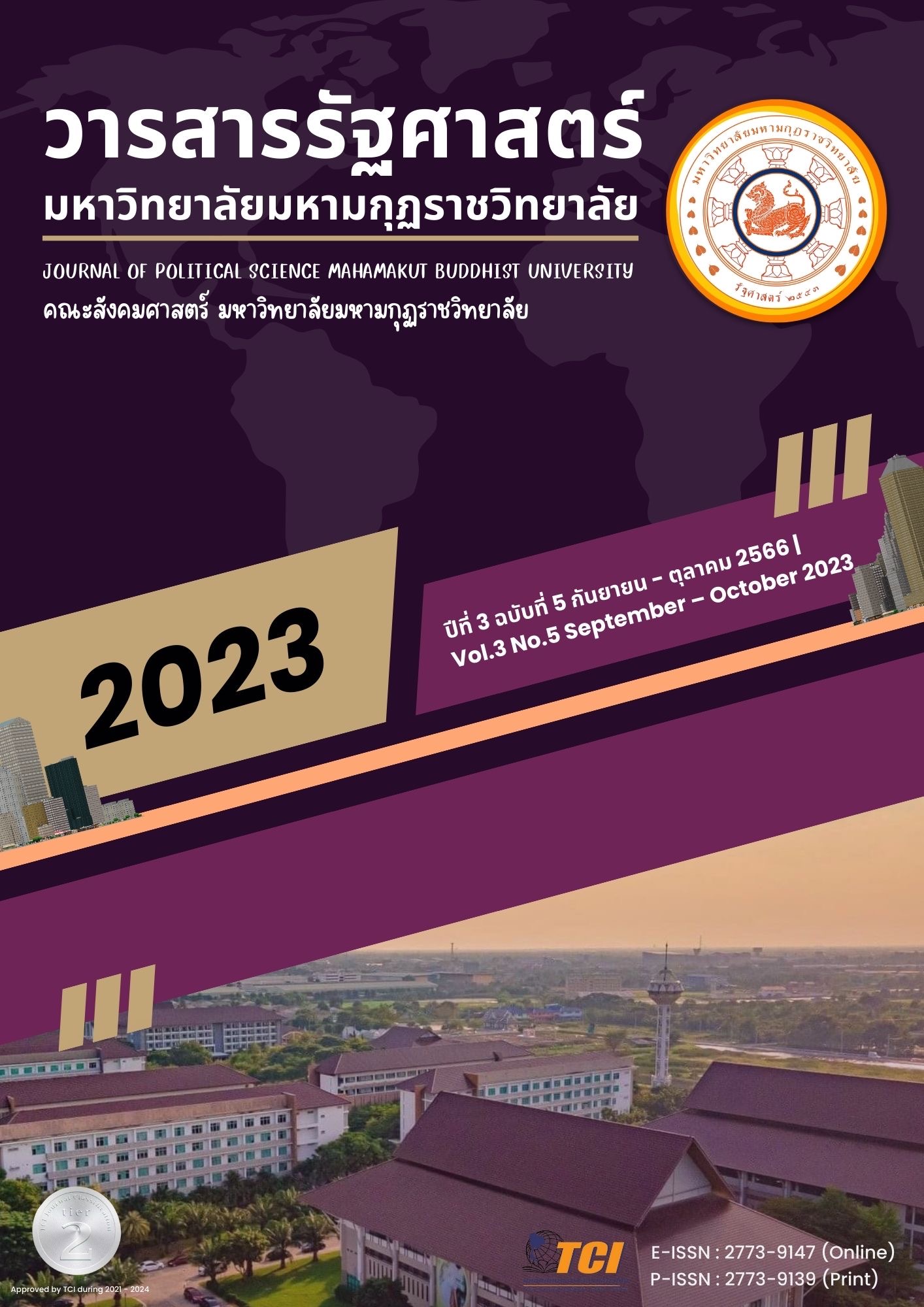INTEGRATING THE PRINCIPLES OF APARIHANIYADHAMMA WITH THAI LOCAL GOVERNMENT INTO THE SMART CITY ERA
Main Article Content
Abstract
This paper presents the integration of Aparihaniyadhamma principles with local government into the Smart City era. The objective is to develop the local area to be efficient, effective and safe. Focusing on bringing technological media to the local administration system under the seven principles of Aparihaniyadhamma: (1) meeting regularly (2) having shared responsibility (3) following rules and regulations (4) ) Respect elders (5) Not selfish (6) Not careless, able to perform assigned missions (7) Support good people, protect good people, promote good people, and choose good people. And Smart City has a total of 7 points: (1) Smart Economy, intelligent economy that focuses on the digital industry
(2) SmartTourism, smart tourism for tourists (3) Smart Safety, safety in tourism
(4) Smart Environment, urban growth along with environmental protection
(5) Smart Healthcare, providing health services to People (6) Smart Education Education to create knowledge for people under the concept of Smart People for Smart City (7) Smart Governance, public sector management. which the author integrates as follows: (1) Intelligent Citizens consists of meeting regularly. Sharing responsibility and selflessness (2) Smart living consists of following rules and regulations. and supporting good people Protect good people and choose good people. (3) Intelligent public administration consists of respecting and respecting elders. Not being careless and being able to perform assigned missions very well. Moreover, it can also develop the potential of administrators and local civil servants to be professional. Work quickly and accurately and respond to the needs of citizens in an era where technology plays an important role in local development.
Article Details

This work is licensed under a Creative Commons Attribution-NonCommercial-NoDerivatives 4.0 International License.
References
โกวิทย์ พวงงาม. (2550). การปกครองท้องถิ่นไทย หลักการและมิติใหม่ในอนาคต กรุงเทพมหานคร: วิญญูชน.
โกวิทย์ พวงงาม (2555) การปกครองท้องถิ่นไทย หลักการและมิติใหม่ในอนาคต กรุงเทพมหานคร: วิญญูชน.
โกวิทย์ พวงงาม (2555) การปกครองท้องถิ่นไทย หลักการและมิติใหม่ในอนาคต กรุงเทพมหานคร: วิญญูชน.
ณัฏฐ์ณัชชา ไชยประเสริฐ. (2565). บทบาทท้องถิ่นกับการบริหารจัดการเมืองแบบ Smart City วารสาร มจร บาลีศึกษาพุทธโฆสปริทรรศน์, 8 (1), 73-74.
ณัชชา โคตะ (2566). ฝ่ายส่งเสริมเมืองอัจฉริยะฝ่ายส่งเสริมอุตสาหกรรม. เรียกใช้เมื่อ 16 กันยายน, 2566, จาก https://www.depa.or.th/th/article-view/smart-governance
ณัฐพงษ์ ญาณเมธี (ไกรเทพ), (2565), มนุษย์กับศาสตร์แห่งการปกครอง, วารสารมหาจุฬานาครทรรศน์, 9(4),525.
รงค์ บุญสวยขวัญ. (2557). การจัดการทางสังคม : การจัดการองค์กรประชาชน การจัดองค์กรทางสังคม การจัดการองค์กรที่ไม่ใช่รัฐ การจัดองค์กรเพื่อการเคลื่อนไหวทางสังคม. สมาคมรัฐศาสตร์แห่งมหาวิทยาลัยเกษตรศาสตร์.
สมเกียรติ สุวรรณธานี .(2552). “การมีส่วนร่วมของประชาชนในการเลือกตั้งสมาชิกสภาท้องถิ่นในเขตองค์การบริหารส่วนตำบลประทาย” จังหวัดนครราชสีมา. ใน วิทยานิพนธ์รัฐประศาสนศาสตร์. มหาวิทยาลัยอีสาน.
อเนก เหล่าธรรมทัศน์. (2550). ประชาธิปไตยท้องถิ่น : แง่คิดเกี่ยวกับนโยบายสาธารณะในระดับท้องถิ่น. กรุงเทพมหานคร: มูลนิธิสาธารณสุขแห่งชาติ.
Meijer, A. & Bolívar R.P.M. (2016). Governing the Smart city : A Review of theLiteratureonSmart Urban Governance. InternationalReview of Administrative Sciences, 82(2), 392–408.
Smart City เมืองอัจฉะริยะที่ทุกคนสามารถอาศัยแบบ Work Smart เรียกใช้เมื่อ 16 กันยายน 2566, จาก https://nt-metro-service.com/article/tech-trend/smart-city


